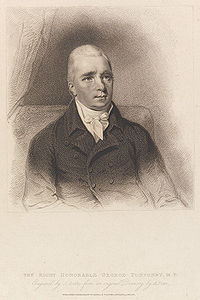George Ponsonby
George Ponsonby | |
|---|---|
 George Ponsonby. | |
| Lord Chancellor of Ireland | |
| In office 1806–1807 | |
| Monarch | George III |
| Prime Minister | The Lord Grenville |
| Preceded by | The Lord Redesdale |
| Succeeded by | The Lord Manners |
| Personal details | |
| Born | 5 March 1755 |
| Died | 8 July 1817 (aged 62) |
| Nationality | British |
| Political party | Whig |
| Alma mater | Trinity College, Cambridge |
George Ponsonby (5 March 1755 – 8 July 1817), was a British lawyer and Whig politician. He served as Lord Chancellor of Ireland from 1806 to 1807 in the Ministry of All the Talents.
Background and education[edit]
Ponsonby was the second surviving son of the Honourable John Ponsonby, speaker of the Irish House of Commons (1756–71), and his wife, Lady Elizabeth Cavendish (1723–1796), daughter of William Cavendish, 3rd Duke of Devonshire. He was educated at Kilkenny College and at Trinity College, Cambridge.[1]
Legal and political career[edit]
A barrister, Ponsonby became a member of the Irish House of Commons in 1776. He sat for Wicklow between 1778 and 1783 and subsequently for Inistioge between 1783 and 1797. From 1798 until the Act of Union in 1801, he represented Galway Borough.[citation needed] Ponsonby was Chancellor of the Irish Exchequer in 1782, afterwards taking a prominent part in the debates on the question of Roman Catholic relief, and leading the opposition to the union of the parliaments.[2]
After 1801 Ponsonby represented County Wicklow and then Tavistock in the Parliament of the United Kingdom; in 1806 to 1807 he was Lord Chancellor of Ireland, and from 1808 to 1817 he was the recognised leader of the opposition in the British House of Commons.[2]
Ponsonby had been selected as the first recognised leader of the opposition, rather than leader of an opposition, when the two leading Whig peers Lord Grenville and Earl Grey, proposed him to Whig MPs. Ponsonby was described by Foorde as "a little-known mediocrity who was related to Lady Grey". He proved to be a weak leader, but was unwilling to resign and so retained the leadership of the party in the House of Commons until his death. He was succeeded as party leader by George Tierney.
Personal life[edit]
In Dublin, he was a member of Daly's Club.[3]
He married Lady Mary Butler, the daughter of Brinsley Butler, 2nd Earl of Lanesborough and his wife Lady Jane Rochfort. He left an only daughter, Elizabeth, when he died in London on 8 July 1817, who went on to marry Francis Aldborough Prittie, MP, by whom she had six children.
References[edit]
- ^ "Ponsonby, George (PNSY773G)". A Cambridge Alumni Database. University of Cambridge.
- ^ a b One or more of the preceding sentences incorporates text from a publication now in the public domain: Chisholm, Hugh, ed. (1911). "Ponsonby, John s.v. George Ponsonby". Encyclopædia Britannica. Vol. 22 (11th ed.). Cambridge University Press. p. 62.
- ^ T. H. S. Escott, Club Makers and Club Members (1913), pp. 329–333
- Walker, Brian M., ed. (1978). Parliamentary Election Results in Ireland, 1801–1922. Royal Irish Academy.
- His Majesty's Opposition 1714–1830, by Archibald S. Foorde (Oxford University Press 1964)
External links[edit]
- 1755 births
- 1817 deaths
- People educated at Kilkenny College
- Alumni of Trinity College, Cambridge
- Irish MPs 1776–1783
- Irish MPs 1783–1790
- Irish MPs 1790–1797
- Irish MPs 1798–1800
- Lord chancellors of Ireland
- Members of the Privy Council of the United Kingdom
- Members of the Privy Council of Ireland
- Members of the Parliament of the United Kingdom for County Wicklow constituencies (1801–1922)
- Members of the Parliament of the United Kingdom for Tavistock
- Ponsonby family
- UK MPs 1801–1802
- UK MPs 1802–1806
- UK MPs 1807–1812
- UK MPs 1812–1818
- Whig (British political party) MPs for Irish constituencies
- Whig (British political party) MPs for English constituencies
- Members of the Parliament of Ireland (pre-1801) for County Wicklow constituencies
- Members of the Parliament of Ireland (pre-1801) for County Kilkenny constituencies
- Members of the Parliament of Ireland (pre-1801) for County Galway constituencies
